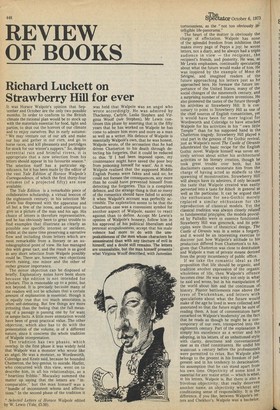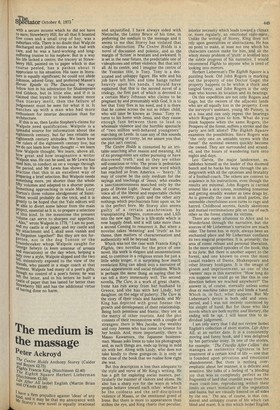Richard Luckett on Strawberry Hill for ever
It was Horace Walpole's opinion that September and October are the only two possible months. In order to conform to the British climate the rational plan would be to stock up with the materials essential for food, light and parties, to shut out the horrors of our climate and to enjoy ourselves. But in early autumn: "We may venture out of our ark and make our hay and gather in our corn, and go to horse races, and kill pheasants and partridges for stock for our winter's suppers." So, despite torrential rain and brimful rivers, it is appropriate that a new selection from his letters should appear in his favourite season.* The selection itself has a particular significance, for it has been made by the editor of the vast Yale Edition of Horace Walpole's Correspondence, of which the first thirty-four volumes (of a projected fifty) are now available.
The Yale Edition is a remarkable piece of collaborative scholarship, a virtual lexicon of the eighteenth century; in his selection Mr Lewis has dispensed with the apparatus and all but a few of the notes, and attempted to give us a picture of the man and his age. His choice of letters is therefore representative, and he has obviously been to great trouble to find examples that illustrate as clearly as possible one specific interest or incident, whilst at the same time preserving a narrative flow and including those letters which are most remarkable from a literary or an autobiographical point of view. He has managed this with great tact, and the result is as good as any short selection from Walpole possibly could be. There are, however, two objections worth raising, one minor and the other of rather greater importance.
The minor objection can be disposed of briefly. Explanatory notes have been shorn because the edition is not intended for scholars. This is reasonable up to a point, but not beyond. It is precisely because many of the readers will not be scholars that a certain amount of explanation is essential, though it is equally true that too much annotation is often sell-deteating. But few things are more irritating than the feeling that the full mean ing of a passage is passing one by for want of simple facts. A little more annotation would have been of great practical value. The other objection, which also has to do with the presentation of the volume, is of a different nature, since it concerns the whole tradition of Walpole interpretation. The tradition has two phases, which overlap. In the first phase it was widely held that Walpole was a monster who wrote like an angel. He was a monster, so Wordsworth, Coleridge and Keats said, because he hounded Chatterton, the boy-genius, to suicide. Hazlitt, who concurred with this view, went on to describe him, in all his relationships, as a "heartless fribble." Macaulay summed the matter up saying that the letters are " incomparable," but the man himself was a "bundle of inconsisten't whims and affectations." In the second phase of the tradition it
was held that Walpole was an angel who wrote accordingly. He was admired by Thackeray, Carlyle, Leslie Stephen and Virginia Woolf (nee Stephen). Mr Lewis continues this phase by asserting that in the fifty years that he has worked on Walpole he has come to admire him more and more as a man as well as a writer. His defence of Walpole is essentially Walpole's own, that he was honest. Walpole wrote, of the accusation that he had driven Chatterton to his death through detecting his forgeries, that it could be reduced to this: 'If I had been imposed upon, my countenance might have saved the poor boy from poisoning himself for want'. As it was, Walpole realised that the supposed Middle English Poems were fakes and said so; he could not foresee the consequences, any more than he could have prevented himself from detecting the forgeries. This is a complete defence, and the strange thing is that so many of the romantics should have failed to accept it when Walpole's account was perfectly accessible. The explanation seems to be that the Chatterton case was a convenient symbol for another aspect of Walpole, easier to react against than to define. Accept Mr Lewis's opinion of Walpole's honesty, follow him in his approval of his political liberalism and personal scrupulousness, accept that his male volence had more to do with the unspeakableness of the men whose characters he assassinated than with any tincture of evil in himself, and a doubt still remains. The letters are unassailable, but the man himself presents ' what Virginia Woolf described, with Jamesian
tortuousness, as the "not too obviously intelligible life-panorama." The heart of the matter is obviously the charge of affectation. Walpole has none of the splendid freedom from inhibition that makes every page of Pepys a joy; he wrote letters, not a diary, and he always had a triple audience in view — the recipient, the recipient's friends, and posterity. He was, as Mr Lewis emphasises, continually speculating
about what the future would make of him. He was inspired by the example of Mme de Sevigne, and imagined readers of the future approaching his letters just as he approached hers. He foresaw the future importance of the United States, many of the social changes of the nineteenth century, and a surprising number of modern inventions. He also pioneered the tastes of the future through his activities at Strawberry Hill. It is customary to point to Strawberry Hill as one of the chief sources of English romanticism, yet it would have been far more logical for Wordsworth and Coleridge to have attacked Walpole for his activities in his "own little Temple" than for his supposed hand in the Chatterton tragedy. Strawberry Hill played a vital part in the genesis of the Gothic revival, just as Walpole's novel The Castle of Otranto adumbrated the basic recipe for the English Gothic novel. Walpole himself was never entirely serious about either his architectural, activities or his literary creation, though he took great trouble over both, but his disclaimers cannot exonerate him from the charge of having acted as midwife to the spawning of monstrosities. Strawberry Hill will always have its admirers, if only because the taste that Walpole created was easily perverted into a taste for kitsch in general as well as the particular. It can be argued that the enthusiasm for neo-Gothic merely replaced a similar enthusiasm for the reproduction of classical models. Yet the classical tradition was always closely related to fundamental prinFiples; the models provided by Palladio were in essence functional. Strawberry Hill was gimcrack, and its principles were those of theatrical design. The Castle of Otranto was in a sense a forgery, and it would be an interesting exercise to discover just how Walpole's attitude to his production differed from Chatterton's to his, given that Chatterton was close to destitution and Walpole a man of private means derived from the proxy incumbency of public office. If we take the romantic ideal as the proposition that life should be organic, and tradition another expression of the organic wholeness of life, then Walpole's offence becomes clear. He was witty not only in what he said and wrote, but in his manipulation of the world about him and the continuum of. history. Plaster battlements rose above the trees of Twickenham, and letters with speculations about what the future would make of the age he lived in were collected and annotated so that the future might be sure of reading them. A host of commentators have remarked on Walpole's'modernity',on the fact that he reads as though he might be a contemporary of our own, transported into the eighteenth century. Part of the explanation is simply his excellence as a writer and his adopting, in his letters, of an unbuttoned style with clarity, directness and conversational ease as its chief constituents. He undid his waistcoat a century before the professionals were permitted to relax. But Walpole also belongs to the present in his freedom of judgement and in his tendency to deracination, his assumption that he can stand apart from his own time. Objectivity of some kind is essential for any maior artist — which is what, in his letters, Walpole is. But there is also a frivolous objectivity, that really deserves another name, an objectivity without any conditioning sense of responsibility. It is the difference, if you like, between Walpole's letters and Chekhov's. Walpole was a bachelor, with a secure income which he did not have to earn; Strawberry Hill, for all that ft boasted five cows and a small crop of hay, was a suburban villa. There is no doubt that Walpale discharged such public duties as he had with care, and he was a hard-working and longsuffering trustee to his nephew. But in a way his life lacked a centre; the tracery at Strawberry Hill, painted on to paper which in due course peeled, has a pathos about it aPproriate to his situation. His taste in literature is equally significant; he could not abide Johnson, adored Gray, and preferred Mason's Heroic Epistle to The Dunciad. We may follow him in his admiration for Shakespeare and Gibbon, but in little else, and if it is Claimed that loyalty to friends meant more than literary merit, then the failure of Judgement must be seen for what it is. It Matches up with a man who had more enthusiasm for interior decoration than for architecture.
If this is so, then Leslie Stephen's claims for Walpole .,need qualification. Walpole is a Splendid source for information about the eighteenth century, but far less reliable on eighteenth century attitudes. We learn how the rulers of the eighteenth century live, but ,_Ive do not learn how they thought — we learn Pow Walpole thought. We learn, above all, „,now great and how imaginative a writer Walpole was. He can be used, as Mr Lewis has used him, to conduct us on a voyage through the period, and Mr Lewis has shown by his Practise that this is an excellent way of Preparing a brief selection. But Walpole needs sOmething more, yet shorter than the whole fifty volumes and adapted to a shorter purse. oniething approaching in scale Miss Lucy N.orton's three volume abridgement of SaintSimon would probably do the trick, and it is greatly to be hoped that the Yale editors will he able to divert some labour from the main Project, essential as it is, to prepare a selection of this kind. In the meantime the present ?,olume can serve to sharpen our appetites. Alas," wrote Walpole in 1778, "1 am no poet, and my castle is of paper, and my castle and k_nlY attachment and I, shall soon vanish and ue forgotten together!" But they are not forgotten, not is the dog Tonton or the 4ousebreaker whom Walpole caught for eorge Selwyn (a keen amateur of arrests Pld executions) or the day when, helping a ',.adY over a style, Walpole slipped and the two extensively exposed to the view of the 1rlends, who passed in a stage coach at that rtooment. Walpole had many of a poet's gifts, .hough no control of a poet's forms; he was left the letter, and in his letters he built a stle of paper that has lasted far better than trawbel _ Hill and has the additional virtue °f having done no harm.



































 Previous page
Previous page